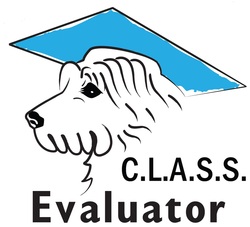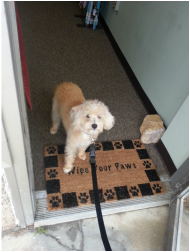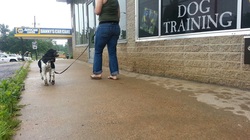
We are so very excited to announce that Kelli Bausch has completed all requirements to become recognized through the Association of Pet Dog Trainers (The A.P.D.T. is the largest professional association of dog trainers in the world.) to conduct C.L.A.S.S evaluations! She is one of only three evaluators in the state of Kansas approved to do C.L.A.S.S. evaluations!
What is C.L.A.S.S?

Maggie showing off the C.L.A.S.S skill of waiting at the doorway!
C.L.A.S.S. stands for Canine Life and Social Skills. It is an educational program to promote training focused on the use of positive reinforcement and to strengthen relationships between humans and their canine companions. C.L.A.S.S. is a three-level
assessment program for pet owners to test real-life skills with their canine companions. The three levels of the program are named after university degree programs: the B.A. (Bachelor’s level), the M.A. (Master’s level), and the Ph.D. (Doctorate level). Through successfully completing each C.L.A.S.S. level, pet owners can earn certificates with their dogs in Canine Life and Social Skills.
assessment program for pet owners to test real-life skills with their canine companions. The three levels of the program are named after university degree programs: the B.A. (Bachelor’s level), the M.A. (Master’s level), and the Ph.D. (Doctorate level). Through successfully completing each C.L.A.S.S. level, pet owners can earn certificates with their dogs in Canine Life and Social Skills.
C.L.A.S.S. is more than just an assessment. It is designed with several goals:
• To generate a mindset among owners in how to incorporate skills they learn
in dog training classes into daily living with their dogs
• To raise the bar in pet dog training and manners via high standards
required to pass each C.L.A.S.S. level
• To improve relationships between dogs and owners through education and
promotion of positive reinforcement and ongoing training
• To reinforce responsible pet ownership through an online test on basic dog
behavior and care, and a veterinarian certificate demonstrating the dog’s health
care
• To increase awareness for owners of additional training resources
available, including helping to find the right professional dog trainer for
their needs
• To support training efforts of animal shelters and rescues, and promote
dogs for adoption
As C.L.A.S.S. expands, it is the vision of the Association of Pet Dog Trainers (APDT) that there will be more well-trained, socialized pets in society, and opportunities for increased benefits and acceptance in communities.
Why choose C.L.A.S.S?

Toby practicing the skill of "Settle" on his mat!
Many of you may be familiar with another program similar to this called the Canine Good Citizen Test which was developed by the American Kennel Club. I looked at both programs and decided to go with class for several reasons.
First and foremost, I was thrilled that the program has a focus on getting more dogs adopted. Evaluators who only evaluate shelter dogs get a discount on their evaulator fee and adoptable dogs who pass their C.L.A.S.S. evaluations get posted on the C.L.A.S.S website as dogs looking for their furever homes! Many of you who know me well know that something I am passionate about is seeing more behavior issues addressed in shelters. Overpopulation is certainly an issue and accounts for all the litters of puppies that find themselves in the shelter but most adult dogs who wind up there did have a home that decided not to keep them for one reason or another (usually lack of training).
Another reason I fell in love with this program is that it focuses on the dog and owner at a team, rather than just testing and evaluating the dog. While this may make some of your hearts flutter when thinking about being "tested", it really makes the test more meaningful AND is closer to the focus most Therapy dog evaluations take of approving a "team" (dog and owner), not just a dog to be a therapy dog.
I also liked that their were several levels to the program (a bachelors, a masters, and a doctorate, how cute is that?). Many owners pass the CGC and don't know what to do next with their dog. I think 3 levels is more comprehensive and more indicitave of the journey most owners take in training their dog.
The scoring of the evaluations was also something that caught my eye, in the CGC every item is either pass or fail while the CLASS system gives 4 categories: Excellent, Needs Work, Incomplete, and Automatic Incomplete. Having watched many CGC evaluations it is difficult to group ALL dogs tested into only 2 categories and I find having a wider scale to place performance on is very helpful to the evaluator and the owner getting evaluated!
I also believe the skills on the test are a more accurate simulation of skills needed in real life to be a good ambassador for dogs everywhere. Dogs need to be good at skills like waiting at doorways, loose leash walking, meet and greets, settle on a mat, stay etc.
First and foremost, I was thrilled that the program has a focus on getting more dogs adopted. Evaluators who only evaluate shelter dogs get a discount on their evaulator fee and adoptable dogs who pass their C.L.A.S.S. evaluations get posted on the C.L.A.S.S website as dogs looking for their furever homes! Many of you who know me well know that something I am passionate about is seeing more behavior issues addressed in shelters. Overpopulation is certainly an issue and accounts for all the litters of puppies that find themselves in the shelter but most adult dogs who wind up there did have a home that decided not to keep them for one reason or another (usually lack of training).
Another reason I fell in love with this program is that it focuses on the dog and owner at a team, rather than just testing and evaluating the dog. While this may make some of your hearts flutter when thinking about being "tested", it really makes the test more meaningful AND is closer to the focus most Therapy dog evaluations take of approving a "team" (dog and owner), not just a dog to be a therapy dog.
I also liked that their were several levels to the program (a bachelors, a masters, and a doctorate, how cute is that?). Many owners pass the CGC and don't know what to do next with their dog. I think 3 levels is more comprehensive and more indicitave of the journey most owners take in training their dog.
The scoring of the evaluations was also something that caught my eye, in the CGC every item is either pass or fail while the CLASS system gives 4 categories: Excellent, Needs Work, Incomplete, and Automatic Incomplete. Having watched many CGC evaluations it is difficult to group ALL dogs tested into only 2 categories and I find having a wider scale to place performance on is very helpful to the evaluator and the owner getting evaluated!
I also believe the skills on the test are a more accurate simulation of skills needed in real life to be a good ambassador for dogs everywhere. Dogs need to be good at skills like waiting at doorways, loose leash walking, meet and greets, settle on a mat, stay etc.
How to Get Started

Harley showing off Leash Walking Skills needed for C.L.A.S.S.
If you have already completed some of our classes, give us a call for a needs assessment to get ready for an evaluation!
If you are just getting started with your training, give us a call to sign up for a Beginner class to get you ready for a Bachelor's evaluation!
785.408.6127
If you are just getting started with your training, give us a call to sign up for a Beginner class to get you ready for a Bachelor's evaluation!
785.408.6127
 RSS Feed
RSS Feed